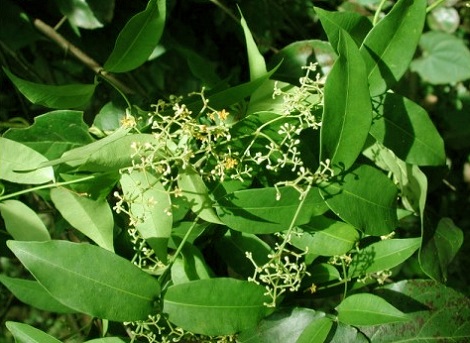West African Plant Secamone afzelii Emerges as a Promising Natural Solution for Obesity
Nikhil Prasad Fact checked by:Thailand Medical News Team Nov 04, 2024 5 months, 2 weeks, 14 hours, 19 minutes ago
Weight Loss News: Obesity, affecting millions worldwide, has led researchers on a quest for safer, effective solutions to manage weight. In an exciting breakthrough, researchers from Covenant University in Nigeria and the University of Colorado Anschutz Medical Campus have studied the traditional African plant Secamone afzelii and its potential as a natural weight management aid. This
Weight Loss News report dives into the findings on how the plant's extracts can inhibit fat breakdown enzymes, offering hope for those seeking natural approaches to weight control.
 West African Plant Secamone afzelii Emerges as a Promising Natural Solution for Obesity
The Power of Secamone afzelii
West African Plant Secamone afzelii Emerges as a Promising Natural Solution for Obesity
The Power of Secamone afzelii
Secamone afzelii, a plant long utilized in West African traditional medicine, has been recognized for reducing fat accumulation. The researchers focused on examining how the plant's leaf (SALE) and vine (SAVE) extracts inhibit pancreatic lipase, a primary enzyme responsible for breaking down dietary fats. The study reveals that blocking pancreatic lipase limits the digestion and absorption of fat, potentially reducing weight gain. Traditional weight-loss drugs often inhibit this enzyme but come with side effects. The team aimed to evaluate if S. afzelii could offer a gentler, effective alternative.
Key Findings: How S. afzelii Extracts Work Against Fat
-Concentration-Dependent Inhibition
Both SALE and SAVE showed a concentration-dependent ability to inhibit pancreatic lipase. The leaf extract (SALE) proved especially effective, demonstrating higher inhibitory activity than the vine extract (SAVE), though both were less potent than the commercial drug Orlistat.
-Mode of Enzyme Inhibition
S. afzelii extracts work through an uncompetitive inhibition mechanism, which means they bind only when the enzyme has already attached to fat molecules. This could prevent adverse effects by partially allowing fat digestion while moderating enzyme activity.
-Chemical Compounds with Anti-Lipase Potential
Through advanced gas chromatography-mass spectrometry (GC-MS) analysis, the researchers identified numerous active compounds in SALE and SAVE. Significant compounds included 9,12-octadecadienoic acid, n-hexadecanoic acid, and 4S,6R-dimethyl-7R-hydroxynonan-3-one. These compounds demonstrated high binding affinity to lipase, meaning they can effectively inhibit the enzyme’s fat-breaking function.
Uncovering the Plant’s Molecular Interactions
By using in vitro (lab-based) and in silico (computer-based) techniques, the team explored how each compound interacts with pancreatic lipase at a molecular level. The binding energy of the top five compounds identified ranged between -7.7 and -6.6 kcal/mol, outperforming Orlistat, the standard obesity drug. This indicates the compounds in S. afzelii could bind more stably with lipase, making it a promising candidat
e for a natural anti-obesity agent.
Pharmacokinetic Insights: What Happens Inside the Body?
The compounds in S. afzelii exhibit favorable pharmacokinetic properties, balancing lipophilic (fat-loving) and hydrophilic (water-loving) qualities. This balance is vital for effective absorption and distribution in the body. Importantly, the compounds are not predicted to cross the blood-brain barrier, which reduces potential side effects. Most compounds also avoid interactions with P-glycoprotein, a protein that could limit the drug's availability in tissues.
Enhancing Obesity Treatment: Future Applications
The study findings suggest S. afzelii’s potential as a complementary weight management strategy. However, further research is necessary to optimize the compounds, especially to improve their solubility and bioavailability for potential use in obesity therapies.
Conclusion: Traditional Wisdom Meets Modern Science
Secamone afzelii, traditionally used in West Africa, shows promise in modern obesity treatment due to its rich bioactive compounds and enzyme-inhibiting properties. The study emphasizes the plant’s potential as a safer, natural option to support weight management, especially with future refinement of its pharmacological properties. Although more research is needed, S. afzelii emerges as an exciting natural contender in the fight against obesity.
The study findings were published in the peer-reviewed journal: Sci.
https://www.mdpi.com/2413-4155/6/4/70
For the latest
Weight Loss News, keep on logging to Thailand Medical News.
Read Also:
https://www.thailandmedical.news/news/study-finds-that-elderberry-juice-is-a-promising-ally-in-gut-health-and-obesity-management
https://www.thailandmedical.news/news/thailand-medical-researchers-explore-triphala-s-role-in-combating-obesity
https://www.thailandmedical.news/news/gymnema-sylvestre-and-berberine-are-effective-natural-alternatives-for-obesity-treatment
https://www.thailandmedical.news/news/move-over-ozempic-and-wegovy-fermented-blackberries-the-new-anti-obesity-and-weight-loss-remedy
